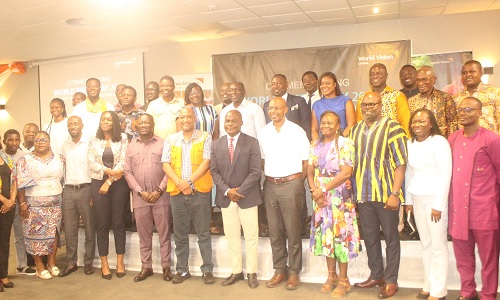The Minister of Local Government and Religious Affairs, Ibrahim Ahmed, has called on metropolitan, municipal and district assemblies (MMDAs) to develop comprehensive and sustainable strategies to promote positive behaviour towards water, sanitation and hygiene (WASH) in their respective communities.
He said without a shift in behaviour, investments in WASH initiatives would not yield the desired outcomes.
“One of the major barriers to sustainable world service delivery is the poor attitude of citizens. In this direction, I wish to encourage MMDAs to roll out comprehensive and sustained change strategies to promote positive behaviour,” Mr Ahmed said.
The minister was speaking at an event organised by World Vision Ghana (WVG) to commemorate World Water Day in Accra on Tuesday.
It was on the theme: “Unlocking the barriers to safe drinking water delivery in Ghana: Reaching everybody, everywhere.”
Investing in data
Mr Ahmed also advised MMDAs to invest in comprehensive data for effective planning and implementation of WASH interventions.
“MMDAs are required to be innovative to attract additional resources. They must also familiarise themselves with all relevant sector policies and strategic documents,” he added.
The minister pledged the ministry's commitment to ensuring that such documents were properly disseminated for the building of the capacities of staff of MMDAs.
“We are committed to working with all stakeholders to ensure that everybody everywhere has access to safe drinking water and improved sanitation for good health and socio economic development,” he said.
The minister further stressed the need for inter-ministerial coordination to harmonise data and find solutions to WASH services, adding that there must be a national conversation on the provision of corporate social responsibilities (CSR), and how they impacted the taxes companies paid.
“It is crucial to examine the CSR practices of companies and ensure that they are genuinely contributing to the well-being of society,” he said.
The minister said this would help create a more equitable system where companies would be held accountable for the social and environmental impact of their policies.
Partnership
The National Director of WVG, Jean-Claude Mukadi, reaffirmed their commitment to partnering the government and other stakeholders to develop sustainable solutions to challenges in accessing drinking water.
He entreated the government to increase investment in WASH programmes to ensure that every child everywhere had access to safe drinking water.
“Through World Vision's efforts, we have completed and commissioned 958 boreholes fitted with hand pumps in various communities.
“Additionally, we have successfully completed and commissioned 197 solar powered mechanised water supply systems, and provided 368 educational institutions and 157 healthcare facilities with basic safe drinking water sources,” the national director added.
He said as part of his outfit’s seven year WASH business plan ending in 2032, they would collaborate with relevant partners to provide additional facilities for 743,000 children and their families.
Concerns
The Development Geographer of the University of Cape Coast, Professor Simon Mariwah, expressed concern that the current investment trend in WASH services was dwindling.
Other panellists also called for collective efforts to address challenges in the WASH sector, which included poorly constructed and managed WASH facilities that were not sustainable, weak sector coordination and inequitable resource allocation.
They added that the country needed stronger inter-sectoral collaboration to drive the agenda of the WASH sector.
The panellists were the Country Director of IRC, Vida Duti; the Chief Executive Officer of SkyFox Limited, Patrick Apoya, and the Convener of Alliance for Wash Advocacy, Nora Ollennu.

